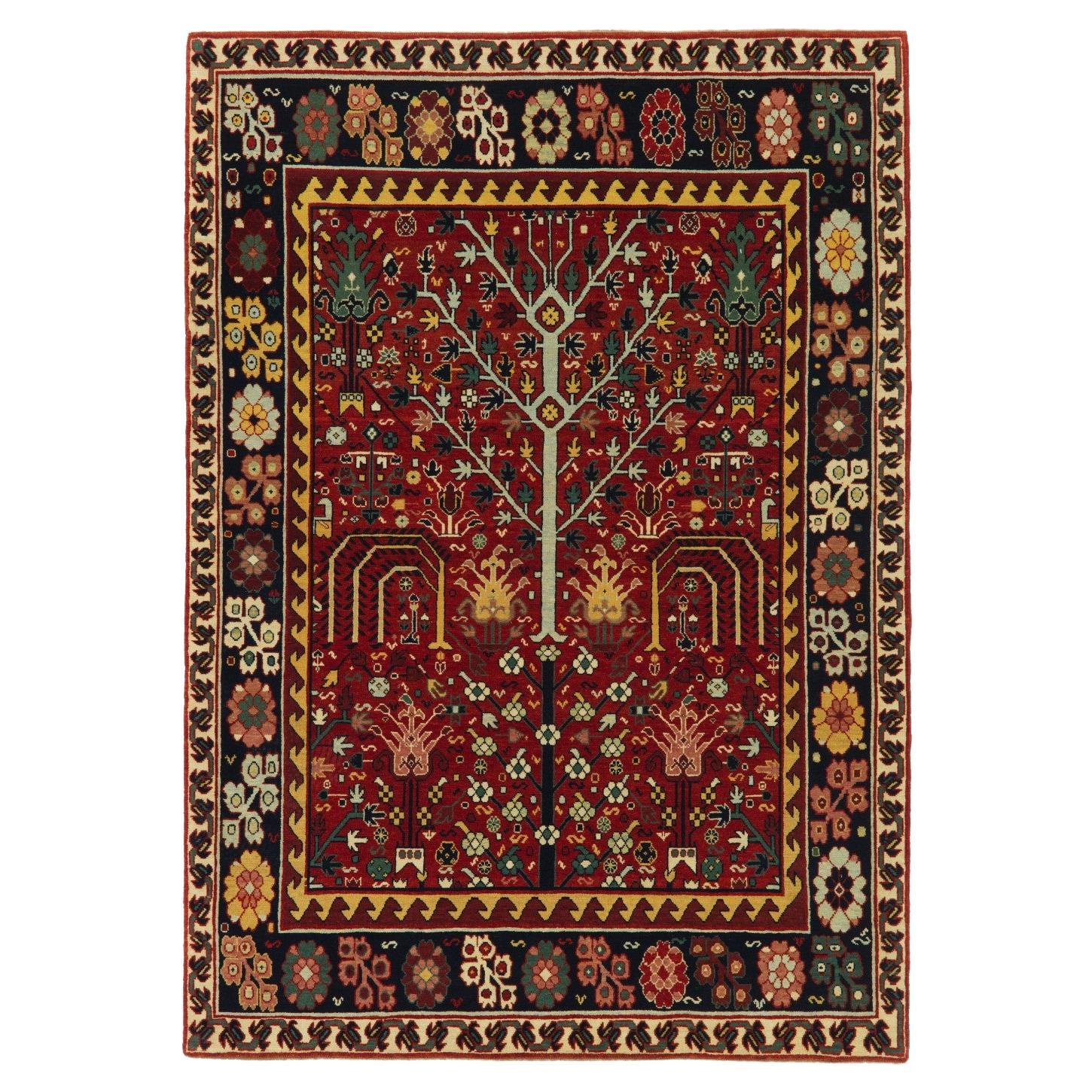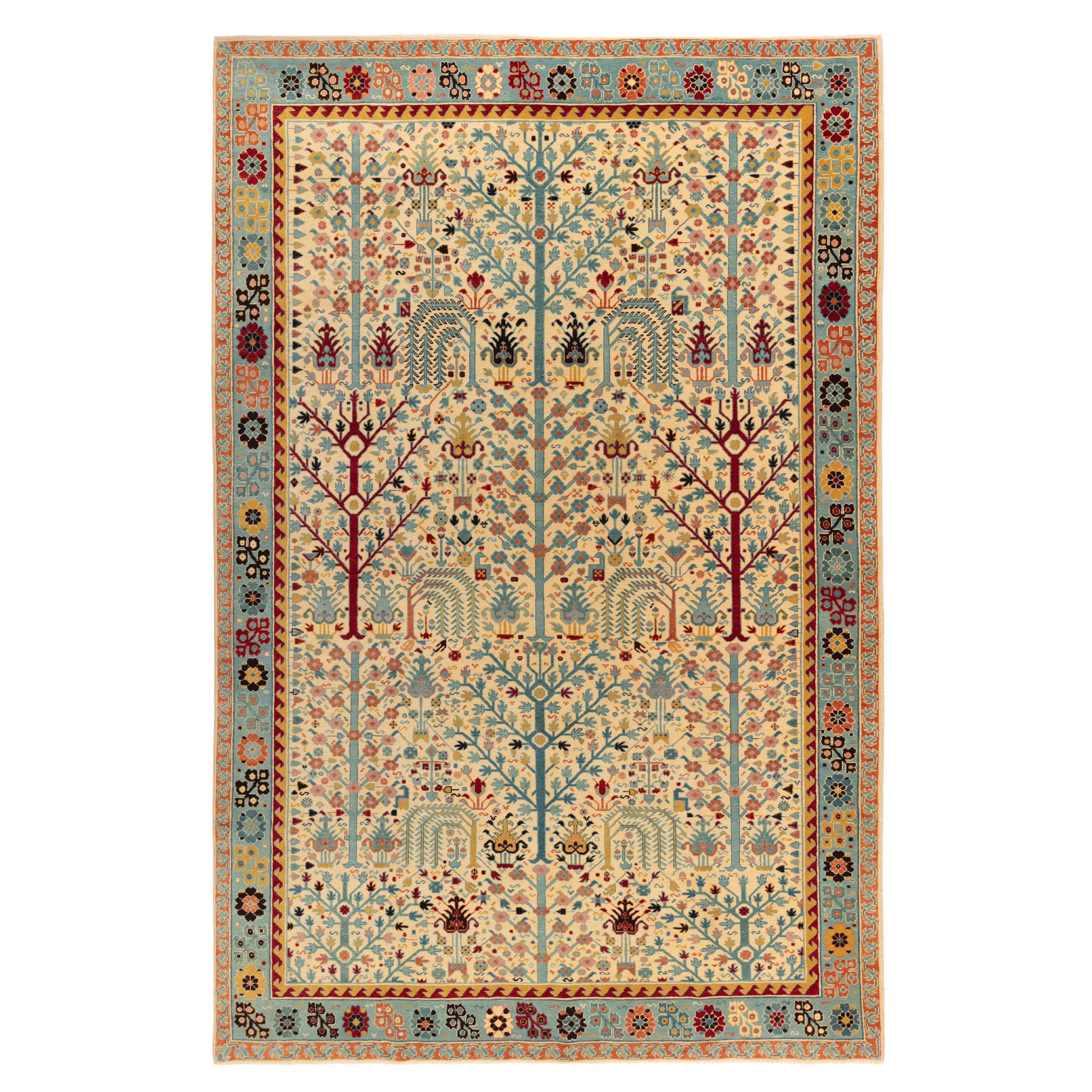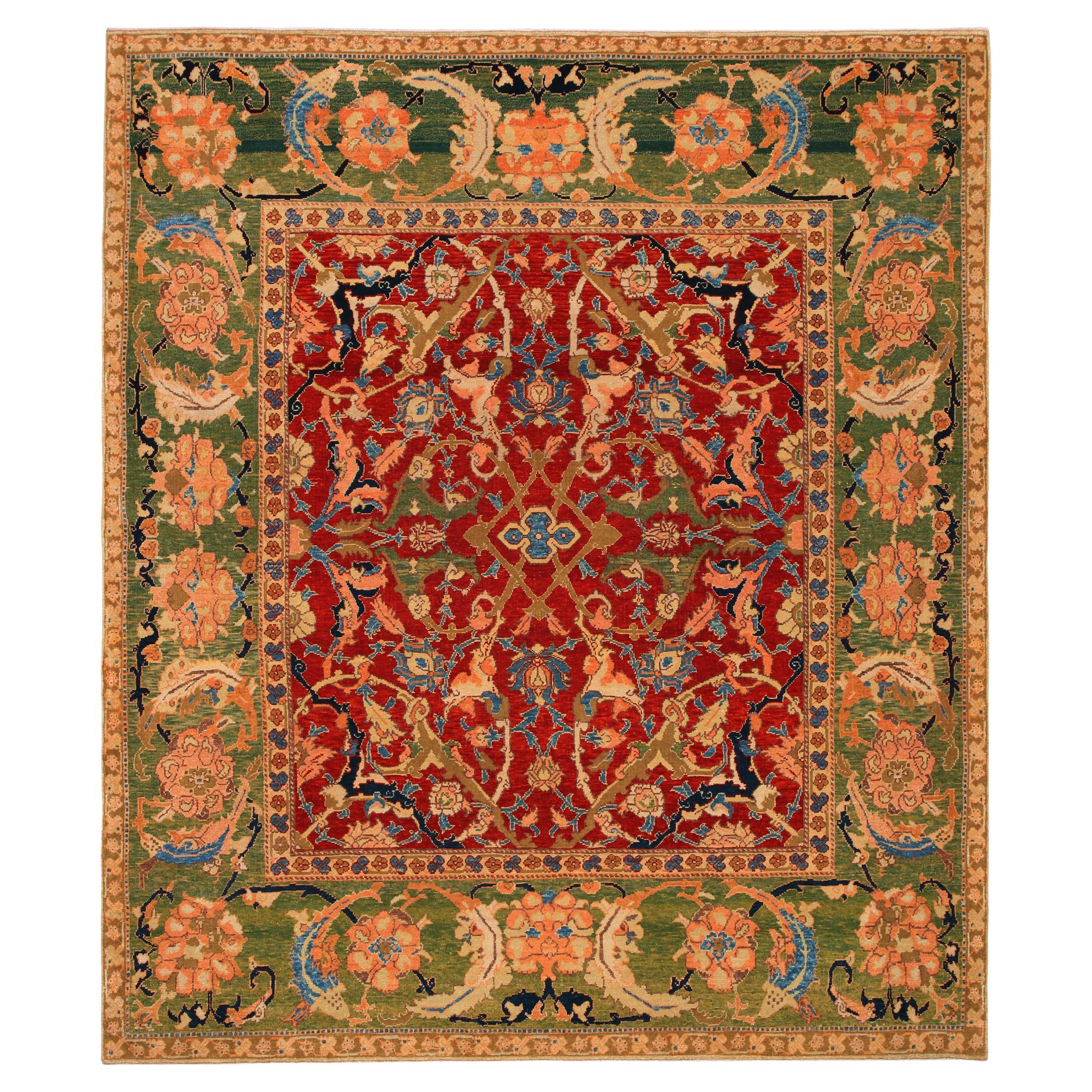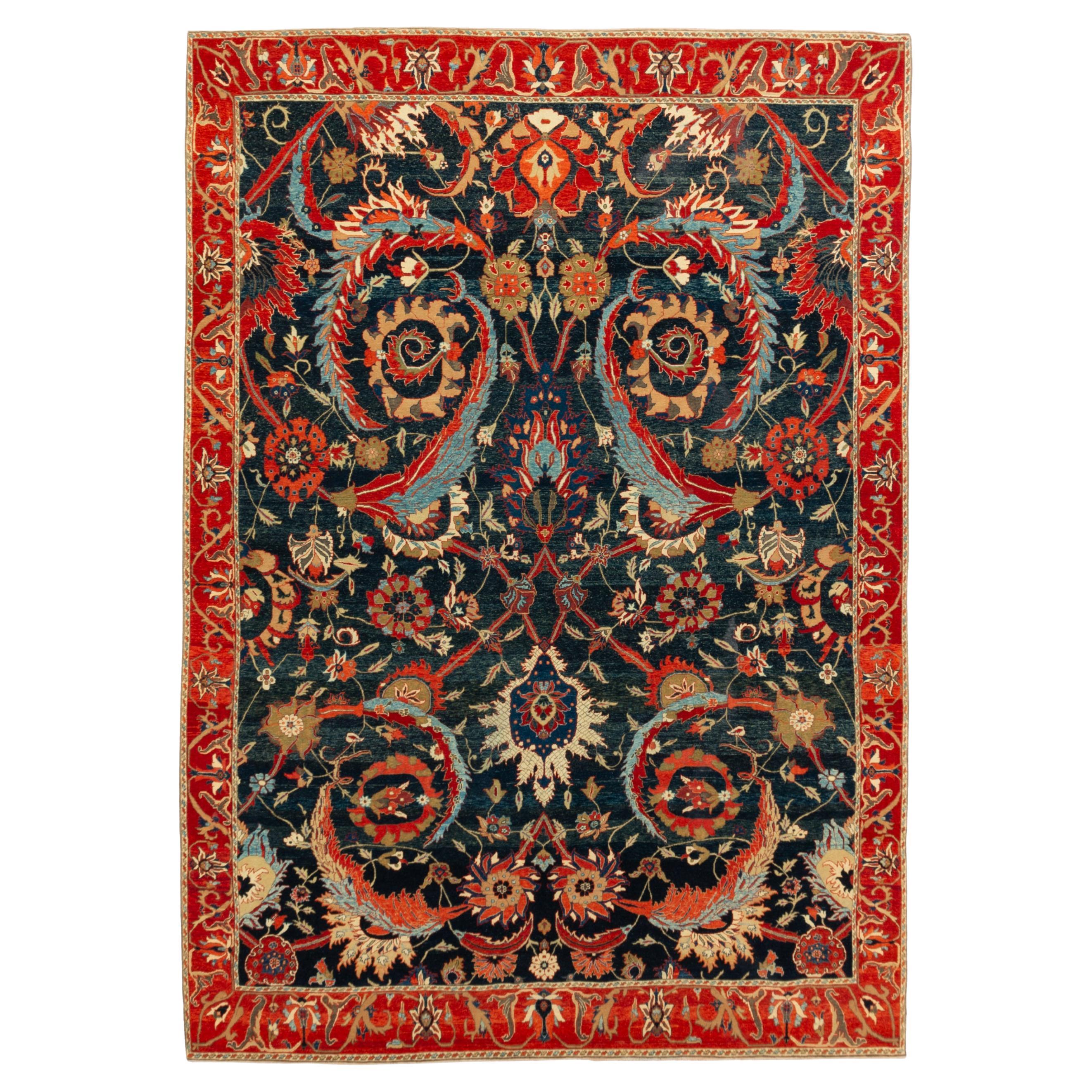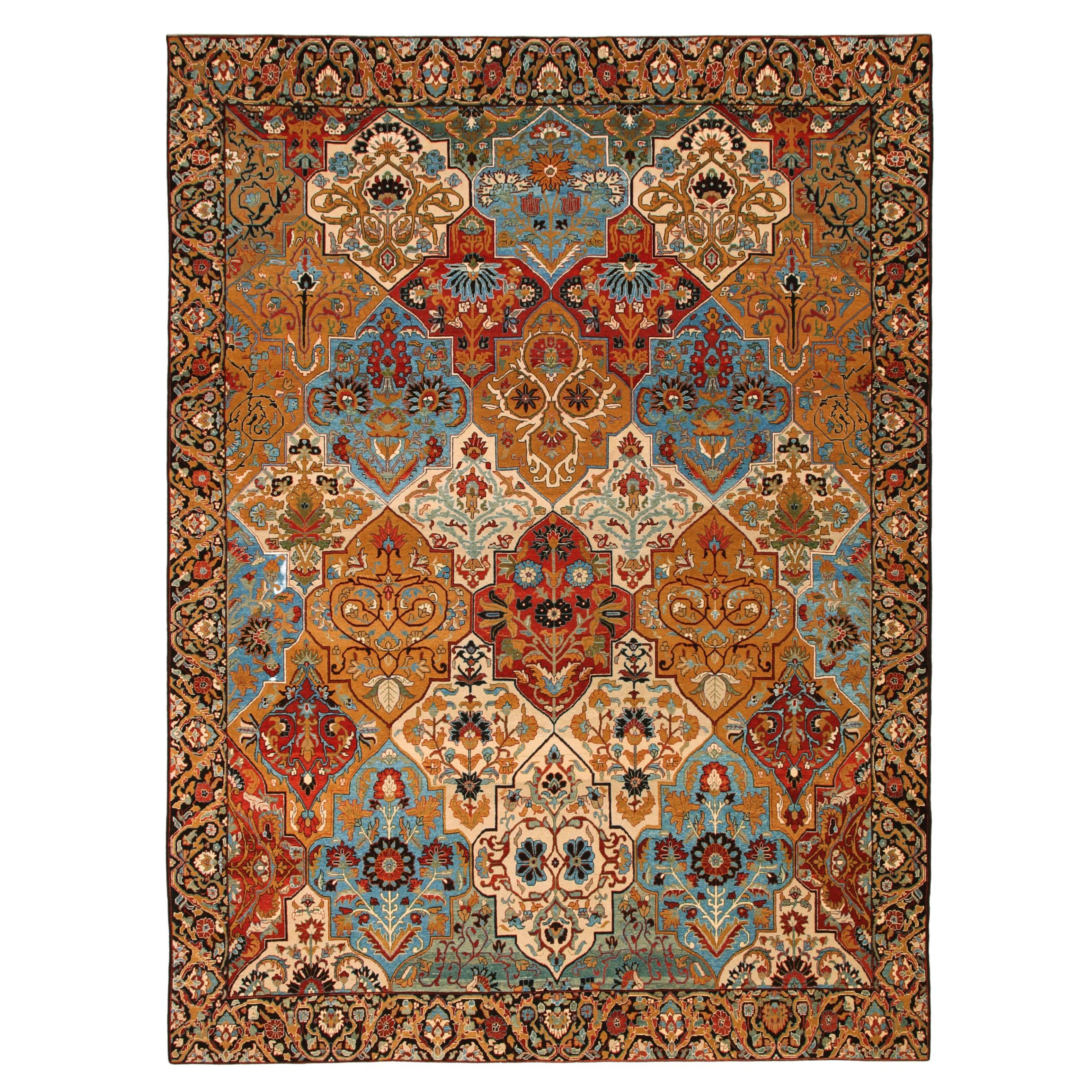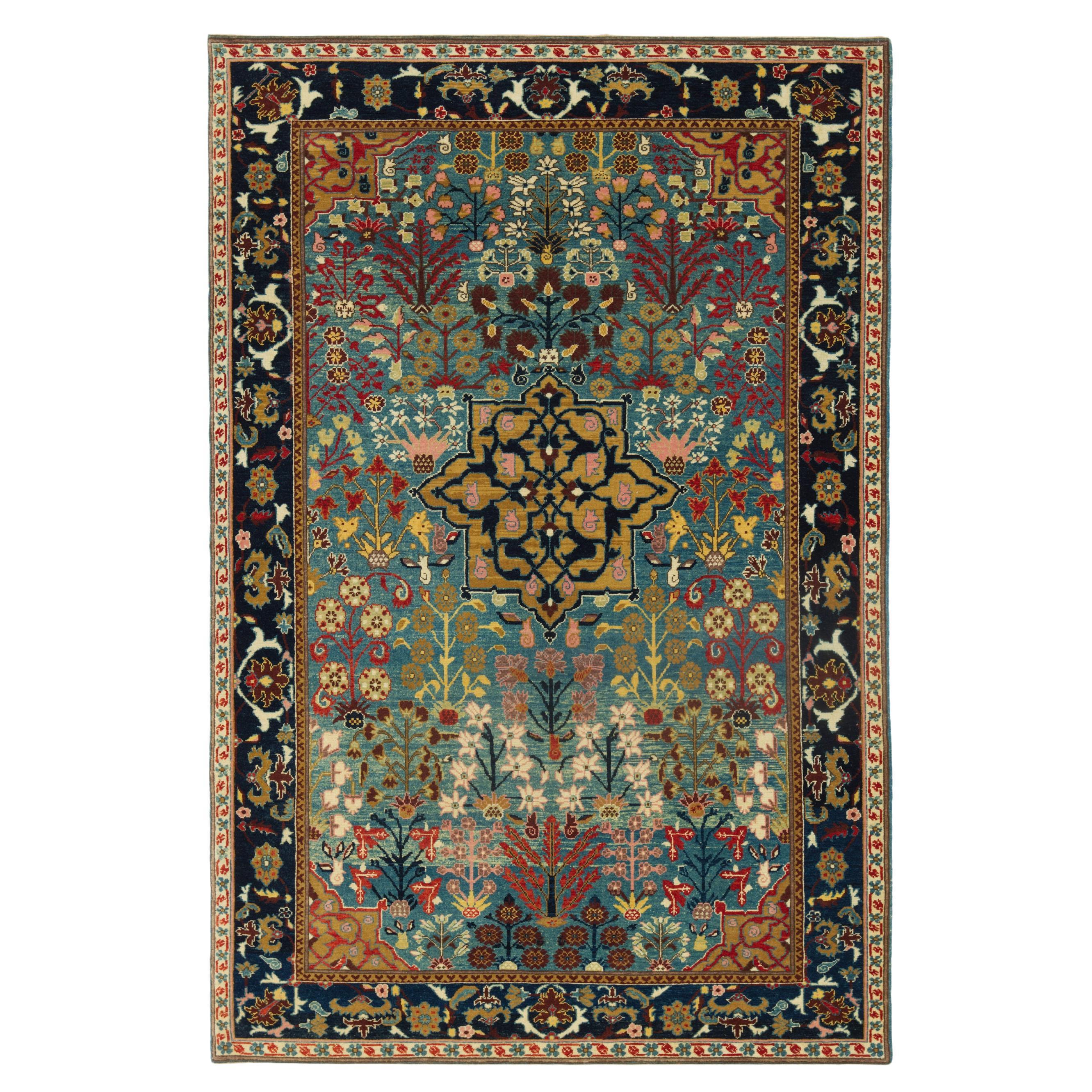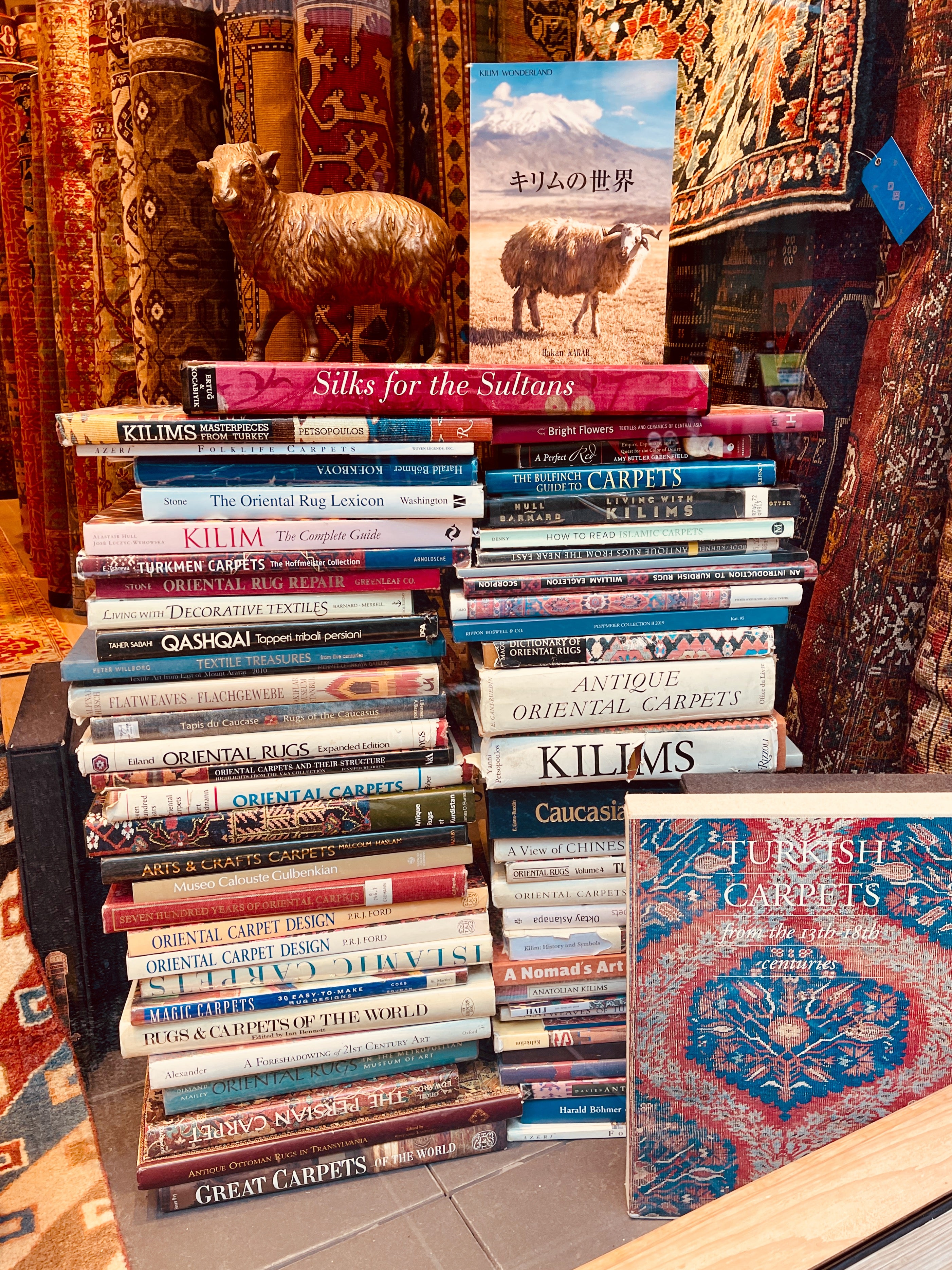Items Similar to Ararat Rugs Bid Majnum on Blue Field Rug, 17th C Revival Carpet, Natural Dyed
Video Loading
Want more images or videos?
Request additional images or videos from the seller
1 of 9
Ararat Rugs Bid Majnum on Blue Field Rug, 17th C Revival Carpet, Natural Dyed
About the Item
The source of the rug comes from the book Antique rugs of Kurdistan A Historical Legacy of Woven Art, James D. Burns, 2002 nr.45. This is a popular design employed by the Kurds, called bid majnum (or Bid Majnun, weeping willow) 17th-century rug from Sa’uj Bulagh, Eastern Kurdistan area. Four different types of trees -cypress, willow, cherry, and plane- can be depicted in these carpets, and the pattern is found on other Persian carpets from the 17th century to the present day. In addition to the weeping willow itself, there are two principal types of trees in this version of the bid majnum pattern: the plane tree with branches and tripartite leaves, and the cherry with white flowers (sakura) in bloom. The plane and cherry are often found in the field and borders of Sa’uj Bulagh rugs. The inner guard has the mountain peak pattern and this rug has many diverse colored floral figures on a dark blue ground. The design of this rug is interpreted by our designers and the most appropriate colors to match the original are used for this rug.
Color summary: 9 colors in total, most used 4 colors are;
Navy Blue 432 (Indigo – Pomegranate)
Imperial Red 426 (Madder Root)
Natural Wool Color 320 (Specially Washed)
Celtic Blue 22 (Indigo)
Group: Northwest Persia Rugs Family
Area: Senna
Material of Pile: Natural Dyed Hand-spun Wool
Material Warp / Weft: Wool on Wool
Structure: Symmetrical knot on depressed warp inclining to the right
Knots Density: 39x45
Production Place: Southeastern Anatolia – Diyarbakir
Stock Location: Tokyo.
Size (EU): 233 X 369cm
Size (US): 7'7" X 12'1"
Area (EU): 8.6m²
Area (US): 92.5ft².
- Creator:Ararat Rugs (Manufacturer)
- Dimensions:Width: 91.74 in (233 cm)Length: 145.28 in (369 cm)
- Style:Revival (In the Style Of)
- Materials and Techniques:
- Place of Origin:
- Period:
- Date of Manufacture:2020
- Production Type:New & Custom(One of a Kind)
- Estimated Production Time:Available Now
- Condition:
- Seller Location:Tokyo, JP
- Reference Number:1stDibs: LU8206232801222
ARARAT RUGS
We know and believe that the geography we come from, our past, and our lifestyle are the most important bond between us to carry the oriental carpet art and culture to the next generations along with our core values in our ongoing growth journey.
We are aware that the way to achieve this goal and carry this priceless art and culture to the future depends on a lot of work with all our people every day while adhering to our core values.
For us, art is meaningful in the sense that it brings together various cultures around the world. It is an honor for us that oriental carpet art and culture have been instrumental in this for centuries and that we are a part of this business.
We are tirelessly keeping an eye on auction house information around the world about carpets. New York's Metropolitan, London's Victoria & Albert Museums, and other famous art museums, as well as small specialized museums that house private collections, and books about oriental carpets to collect information on outstanding carpet designs and patterns from around the world. It's our Self-improving and Self-developing culture.
As Turkish Culture of Hospitality, the Kurdish Culture of Generosity, and as Japanese Culture of Business Punctuality; are the most important values that this multicultural background has taught and bequeathed to us. It is essential and valuable for us that you feel this feeling not only by looking at our oriental carpets but from the moment you contact us.
About the Seller
5.0
Vetted Seller
These experienced sellers undergo a comprehensive evaluation by our team of in-house experts.
Established in 1970
1stDibs seller since 2023
12 sales on 1stDibs
Typical response time: 1 hour
- ShippingRetrieving quote...Ships From: Tokyo, Japan
- Return PolicyA return for this item may be initiated within 7 days of delivery.
More From This SellerView All
- Ararat Rugs Bid Majnum on Red Field Rug, 17th C Revival Carpet, Natural DyedBy Ararat RugsLocated in Tokyo, JPThe source of the rug comes from the book Antique Rugs of Kurdistan A Historical Legacy of Woven Art, James D. Burns, 2002 nr.45. This is a popular design employed by the Kurds, call...Category
21st Century and Contemporary Turkish Revival Persian Rugs
MaterialsWool, Organic Material, Natural Fiber
- Ararat Rugs Bid Majnum on White Field Rug, 17th Century Revival, Natural DyedBy Ararat RugsLocated in Tokyo, JPThe source of the rug comes from the book Antique Rugs of Kurdistan A Historical Legacy of Woven Art, James D. Burns, 2002 nr.45. This is a popular design employed by the Kurds, call...Category
21st Century and Contemporary Turkish Revival Persian Rugs
MaterialsWool, Natural Fiber, Organic Material
- Ararat Rugs Polonaise Carpet, 17th Century Museum Piece Revival, Natural DyedBy Ararat RugsLocated in Tokyo, JPThe source of the carpet comes from the book 'Oriental Rugs in the Metropolitan Museum of Art, by Dimand, Maurice S., and Jean Mailey, The Metropolitan Museum of Art, New York 1973 fig.90.' If the so-called vase-technique carpets represented the triumph of Safavid workshop weaving in the seventeenth century, another group of Safavid carpets, popularly if erroneously known as “Polonaise” or “Polish” carpets, demonstrates the extent to which Safavid weavers would go to create flashy and expensive objects of conspicuous consumption. Polonaise carpets...Category
21st Century and Contemporary Turkish Revival Persian Rugs
MaterialsWool, Natural Fiber, Organic Material
- Ararat Rugs Kerman Vase Technique Carpet 17th Century Revival Rug, Natural DyedBy Ararat RugsLocated in Tokyo, JPThe source of carpet comes from the book Museo Calouste Gulbenkian, Printed by Gulbenkian Museum Lisbon, in 2015, nr.52. This is a vase-technique carpet design in the 17th century in the Kerman region, of Persia. In the 16th century, in Safavid Persia, medallion rugs were among the most appreciated, but at the end of the century and the beginning of the next, a taste for decoration with floral motifs, coils, and palmettes gradually emerged, covering the entire field. This is the case, for this example design, with rugs from eastern and southern Persia. Among the latter are the famous vase-type rugs attributed to the Kerman region, to which our design belongs. Considered by some specialists to be quite atypical, this rug made in Persia, probably in Kirman in the time of Shah Abbas (1587-1625), presents, on a dark blue background, an exuberant and dynamic vegetal decoration in which horizontal and vertical rows of palmettes and stand out, due to their dimension and spiral movements, large sickle-shaped leaves, alternating with branches and flowers. The very narrow rim, with a red background, is filled with a frieze of coils and flowers. It’s a famous carpet design as ‘Kerman Vase Technique Rug, The Most Expensive Rug...Category
21st Century and Contemporary Turkish Revival Persian Rugs
MaterialsWool, Natural Fiber, Organic Material
- Ararat Rugs Kerman Multi-Medallion Carpet 17th Century Revival Rug, Natural DyedBy Ararat RugsLocated in Tokyo, JPThis is an elegant multi-medallion carpet designed 17th century in the Kerman region, Persia. The carpet design shows vigorous rows of eight-pointed star medallions; ornamented with ...Category
21st Century and Contemporary Turkish Revival Persian Rugs
MaterialsWool, Natural Fiber, Organic Material
- Ararat Rugs Kerman Vase Technique Carpet 17th Century Revival Rug, Natural DyedBy Ararat RugsLocated in Tokyo, JPThe design source of the carpet comes from the book Museo Calouste Gulbenkian, Printed by Gulbenkian Museum Lisbon, in 2015, nr.52. This is a vase-technique carpet design in the 17th...Category
21st Century and Contemporary Turkish Revival Persian Rugs
MaterialsWool, Natural Fiber, Organic Material
You May Also Like
- Isfahan Carpet Fragment Rug, 17th CenturyLocated in San Francisco, CAIsfahan Carpet Fragment Rug, 17th Century Isfahan rugs are known for their intricate patterns, often featuring floral and arabesque motifs inspired by...Category
Antique 17th Century Persian Persian Rugs
MaterialsWool
- Antique Chinese Kangxi Carpet Fragment, 17th CenturyLocated in San Francisco, CAAntique Chinese Kangxi Carpet Fragment Rug, 17th Century Additional information: Dimensions: 3'10" W x 5'3" L Origin: China Period: 17th Century (2nd...Category
Antique 17th Century Chinese Chinese and East Asian Rugs
MaterialsWool
- Early 20th Century N.W. Persian Carpet with "Bid Majnoon" Design ( 4' x 5' )Located in New York, NYEarly 20th Century N.W. Persian Carpet with "Bid Majnoon" Design Displaying a variety of trees. Navy background with ivory main border. Hand knotted wool construction. 4' x 5' - 122...Category
Early 20th Century Persian Persian Rugs
MaterialsWool
- 19th Century W. Persian Bijar Carpet with Bid Majnoon Design ( 8'9" x 12'2" )Located in New York, NY19th Century W. Persian Bijar Carpet with Bid Majnoon Design 8'9" x 12'2" - 267 x 370Category
Antique 1880s Persian Persian Rugs
MaterialsWool
- Antique Indo-Isfahan Long Rug, 17th CenturyLocated in San Francisco, CAAntique Indo-Isfahan Long Rug, 17th Century Throughout the 17th century, Persian modes and models played a vital role in the development of the arts in India. Persian artists, craft...Category
Antique 17th Century Indian Indian Rugs
MaterialsWool
- Antique Turkish Oushak Rug, Late 17th CenturyLocated in San Francisco, CAAntique Turkish Oushak Rug, Late 17th Century Additional Information: Dimensions: 6'4" W x 9'4" L Origin: Turkey Period: Late 17th CenturyCategory
Antique Late 17th Century Turkish Turkish Rugs
MaterialsWool
